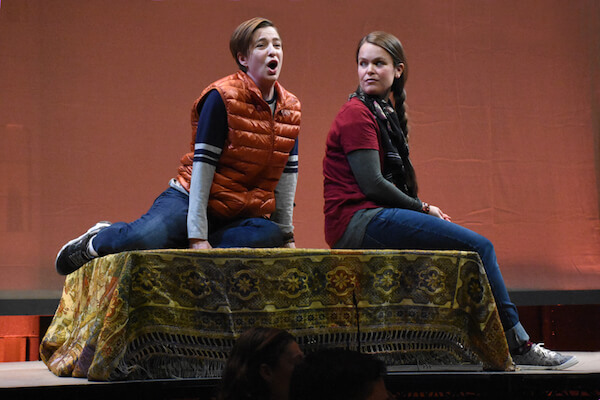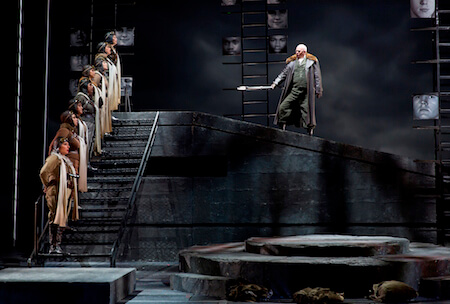Kristin Gornstein and Kelly Curtin as the title characters in Little Opera Theatre of NY’s production of Johann Adolf Hasse’s “Piramo e Tisbe.” | TINA BUCKMAN
The Little Opera Theatre of NY offered a very pleasant surprise at Baruch’s impressive Performing Arts Center March 24 with “Piramo e Tisbe” by Hamburg-born Johann Adolf Hasse (1699-1783), a local premiere. One thinks of Hasse as Handel without the psychology; but the music (under harpsichordist Elliot Figg) was delightful and formally interesting in its lack of boundaries between numbers.
The story, from Ovid, is familiar from its parody in “Midsummer Night’s Dream.” But the rude mechanicals’ Ninny’s Tomb is really Ninus’ Tomb, bringing us back to the world of “Semiramide,” and director Philip Shneidman smartly set the action in a contemporary Middle Eastern patriarchal culture where Tisbe’s mobility (and choice of partner) was circumscribed. Kristin Gornstein’s Piramo was sufficiently androgynous to interrogate the possibility of a same-sex couple bringing down paternal opposition. Gornstein and Kelly Curtin’s higher-flying Tisbe won much sympathy with their unpretentious but impassioned acting and their impressive mastery of baroque style. Both showed fresh voices under excellent control, capable of the needed musical refinements. Would that such fine singers had more places to practice their art in New York!
As Tisbe’s enraged — and later sorrowful — Father, the experienced Brian Downen sang with style and agility intact. The new Vintage Baroque seemed to have shed the billed theorbo player, but the young players showcased energy and commitment. This production was highly worthwhile.
Opera and song by the Hudson and the Puget Sound
On March 1, Yannick Nezet-Seguin led his first “Elektra” with remarkable confidence and sweep — occasionally overpowering his strong cast but promising much for the company’s future. The late Patrice Chéreau’s direction remains highly impactful. Michaela Schuster made an assured, idiomatic company debut as Klytaemnestra; like Mignon Dunn back in the day, she challenged tradition by really singing the oft-ranted part, doing so with handsome human dignity. Chrysothemis proved the best work Elza van den Heever has done locally, with a pleasingly forthright vocal line. Her high notes, if not blazing like the unforgettable Leonie Rysanek and Karita Mattila, dominated the evening decibel-wise. By comparison with her stupendous Chicago (2012) and Boston Symphony (2015) Elektras, Christine Goerke was 100 percent committed dramatically and made wonderfully rich sounds in the lower and middle registers but tended to thin out up top. Mikhail Petrenko’s Orest was resonant if not ideally sonorous or linguistically secure.
Dramatically, however, the Elektra/ Orest recognition scene with Goerke at her most movingly vulnerable was among the high points. Jay Hunter Morris sang and acted Aegisth with clarity (if not much else). Of the rest, most striking were Tichina Vaughn’s booming, trenchant First Maid and Kevin Short’s Guardian. A strong evening.
So, visually, was “Madama Butterfly” one week later, though Marco Armiliato in the pit proved foursquare and unimaginative. This lovely, moving production by the late Anthony Minghella was the Gelb era’s calling card and remains its most consistently enjoyable bread and butter title. Albania’s Ermonela Jaho, if sometime a bit over-mannered in action, proved herself a fine if moderate-scaled vocal artist in the lead: her best assets are dynamic flexibility and an ease on top that compensates for a patchy area in the lower passaggio. She certainly earned her ovation as Cio-Cio-San.
With this show since the start, Maria Zifchak no longer has the freshness on top for Suzuki, but the rest of her voice remains rich and she gives a sympathetic portrayal keyed to each individual Butterfly. Shamefully “computer cast,” Roberto Aronica made a scratch, charm-free Pinkerton; Roberto Frontali now offers no vocal distinction but acted well. Among the unimpressive comprimarios, Hyung Yun (Yamadori) and Edyta Kulczak (Kate Pinkerton) delivered high quality portrayals.
Seattle Opera offered an interesting — and overall successful — intervention into Berlioz’s 1862 opera “Beatrice and Benedict,” slimmed down to the lead romantic plot of the composer’s beloved Shakespeare’s “Much Ado.” Experienced Shakespearean director John Langs and conductor Ludovic Morlot folded back some of the dialogue — and more importantly, some of the concurrent plotting — of the play, including the entire betrayal story involving Don John, Claudio’s denunciation of his bride Hero, and her faked death and resurrection. (Yes, “Much Ado” is a comedy!) This was all to the good; but to add back that action, the team took other pieces of Berlioz’ choral works and set them to Shakespeare-derived text, this giving Claudio (the suitably hunky Craig Verm, in good voice) an aria and the chorus (decent, not outstanding) what to sing at the wedding — the Shepherds’ exquisite chorus from “L’Enfance du Christ,” no less — and mock funeral.
Sometimes music was played under the (amplified) restored dialogue; Hero’s exquisite aria was divided in pieces. Mercifully we lost Somarone’s endless, unfunny main scene: instead, the inventive Kevin Burdette tackled an added song for Baltasar and assumed Dogberry’s function in uncovering the conspiracy: well done.
More disturbingly, we heard only one verse of the score’s best number, the stop-time Duo Nocturne for Hero and Ursula: that’s just wrong. Berlioz as critic and memoirist denounced such monkeying-around (with Gluck, Weber, and Mozart operas) in no uncertain terms, yet he himself adapted Gluck’s “Orphee,” conflating several editions.
After a slightly slow start March 10, what Langs and Morlot concocted, clearly directed by the former with some fine local actors knitted back into the plot, did make a satisfying totality. Deborah Trout’s colorful costumes contributed much to the festivities.
Deploying real-life spouses Alek Shrader and Daniela Mack as the titular leads proved brilliant: they are attractive, highly intelligent performers who spoke as if trained actors. The tenor’s fine, always musically deployed voice recedes on the highest notes these days, and Mack’s lyric but plush voice had to stretch for hers — but they were very good — and should be cast together in a staged “Enfance du Christ.”
Chorister Shelly Traverse — a soubrette rather than the needed lyric — had bravely jumped in as Hero, and sang with increasing confidence. Avery Amereau’s Ursula sounded wonderful, and Daniel Sumegi’s resonant Don Pedro made a strong impression. There were some desertions at intermission, but the majority who stayed whooped their cheers at the end.
Steven Blier’s inimitable, valuable New York Festival of Song offered an inspiriting program March 3 at Hudson Hall upstate, after an initial show at Manhattan’s Merkin. “Protest” took in all manner of theater and popular songs expressing outrage or giving witness to injustice past and — in depressingly many cases — present. One doubts the hearts or minds in attendance on the Upper West Side and in hipster Hudson needed to be changed, but it sure felt good to have a young, diverse, stagewise, and committed cast sing the varied offerings, backed up by Blier on piano and Jack Gulielmetti on guitar.
The admirable forces included Shereen Pimentel, Christine Taylor Price, sopranos; Nicole Flores Thomas, mezzo; Joshua Blue, tenor; Dimitri Katotakis, Jacob Scharfman, baritones; and Andrew Munn, bass. Emotional highlights for me were Pimentel’s distinctively tangy voice on “Big Yellow Taxi,” Munn’s forthright “Joe Hill” — and best of all, the whole company gently tackling Jean Ritchie’s “Now is the Cool of the Day” a cappella, leaving few dry eyes.
David Shengold (shengold@yahoo.com) writes about opera for many venues.





































